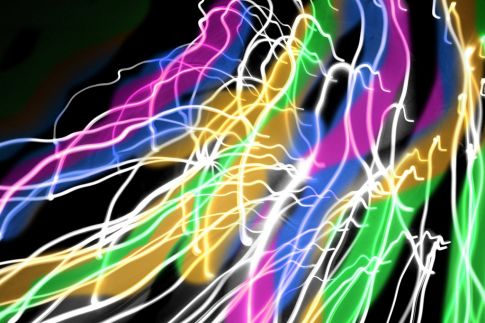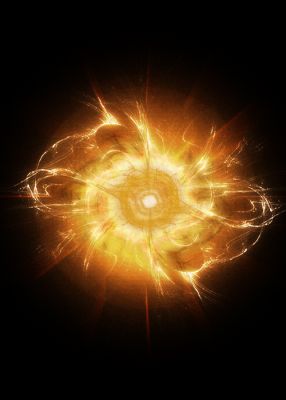
I was nineteen; I had probably been out partying with friends the night before; those were different days. However it came about, I slept through class that morning. It was "Quantum Mechanics for the Myriad," and my college professor was scheduled to lecture on the modern view of energy. Wrapped up as I was in trying to understand how the different families of particles fit together, to say nothing of simply navigating undergraduate life, my mental plate was more than full. Yet I always felt I had missed something critical.
Interestingly, the day I slept through class has stayed in my head more than the days I attended, probably because it placed an unanswered question there--a question of a foundational sort. What is energy, anyway?
We all know the textbook answers. Ask any high schooler and you will be given some version of "energy is the ability to do work." But even when I was in high school myself, that sounded like an evasion. After all, I didn't ask what energy allowed to happen; I asked what it was. The "ability to do" anything is nonspecific, an abstraction; it's definition by way of things other than the subject at hand. It's like that moment in the B-movie when our hero, tied to a chair, asks the masked man who he is and the masked man answers, "I'm the guy holding the gun." Energy is "the ability of a system to do work" always sounds to me like mother nature saying "Shut up; I'll ask the questions here."
Next, the dutiful high schooler will recite that there are types of energy: kinetic, electromagnetic, chemical, and so on. All energy on Earth comes from the Sun (except for geothermal, except for radiation from certain rock layers) and powers all living things (except for the ecosystems around black smokers) and can neither be created nor destroyed (except for virtual particle pairs, especially on event horizons). Gravitational energy results in nuclear fusion in the cores of stars and releases radiant energy that is absorbed by mass, which is condensed energy . . . anyway, we know all this.
But do we? Enumerating a number of familiar phrases doesn't necessarily get to the heart of an issue; it merely makes it seem more, well, familiar. Richard Feynman tells a wonderful story about how he first discovered as a child that, when rolling a toy pickup truck with a ball in the bed, the ball tended to lag behind. (I'm paraphrasing from memory here; perhaps you've seen Feynman recount this tale on various documentaries.) Why does that happen? he asked his father. "No one knows," his Dad said. "It's called inertia."
The point being: Don't confuse having a name for something with understanding what it is.

Ask college students about energy and you will hear that photons, as gauge bosons for electromagnetism, carry the electromagnetic force. Or *are* they the electromagnetic force? We have to be careful with our language. In layman's terms, photons *are* energy (no rest mass) . . . but of course they can have more or less of it depending on frequency, which sounds once again like they are carriers of something else, not pure instances of that something.
Keep going up the ladder of specialization. Grad students can tell you all about scalar, vector, and tensor fields, classical and quantum. Fields, such as the electromagnetic ones, certainly have and transmit conserved quantities, such as momentum and energy. Or are they energy? They are generated by charged particles passing information between them. Or are particles themselves simply field perturbations?
Finally, FQXi grantees can explain (or get a talented science writer to explain for them, I humbly add) such wonderful concepts as negative energy. This "less than zero" power is necessitated by our uncertainty, or possibly the universe's uncertainty, about how much energy is present in empty space. Quantum Mechanics has shown that statistical fluctuations underlie fields, and that the energy density of the void really only averages to zero, rather then being zero by definition. To get an average of zilch, however, there must be some "negative" as well as some "positive" all the time. Grab the negative, by the way, and you might be able to do any number of marvelous things, like creating your own bubble universe in a lab.
Some day a team of physicists will use negative energy to stabilize a traversable wormhole; some day engineers will use micro black holes as energy supply for starships. But even the prospect of such future marvels doesn't convince me we know yet what energy--negative or positive--actually is. If QM has shown anything, it's that we are remarkably adept as a species at manipulating things whose fundamental nature we don't fathom at all.
I'm not even certain what would make for a satisfying answer. Do we have to wait until a successful theory of quantum gravity is produced to suddenly recognize what energy was all along? Do we even know what it is we're looking for - not just how to make the formalism work -- as we try our increasingly complex mathematical approaches? I'm not sure.
So I turn the question to you. FQXi readers are among the most intelligent folks on the web (they are also immune to flattery). We don't mistake poetic hand-waving, which anyone can do, for serious physics; energy is "the breath of the universe" or some such thing is no more useful, here, than "the ability to do work." We all know the formulae; we know the standard definitions. But what is energy?
No, really. What is it?
